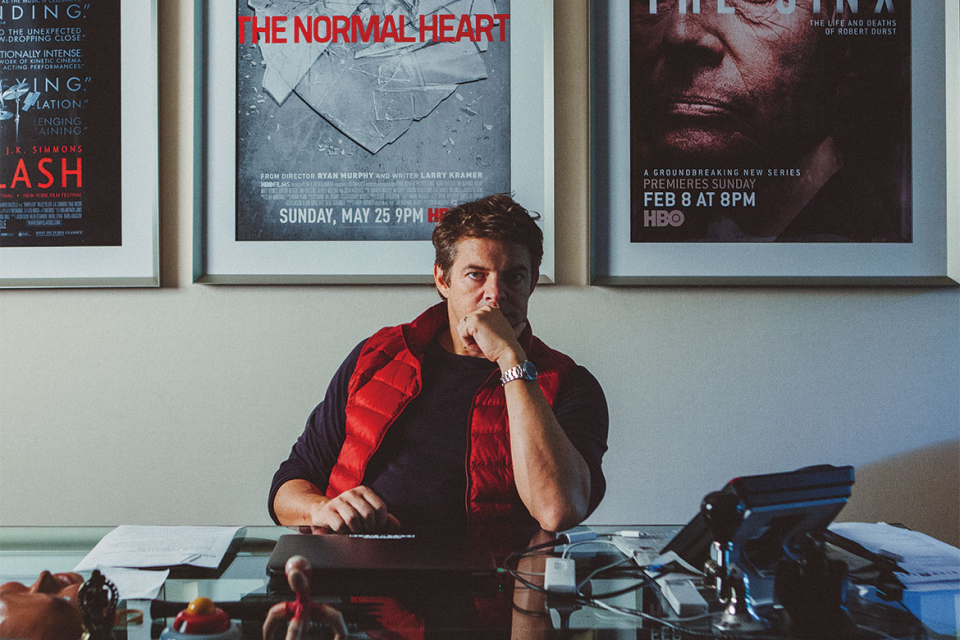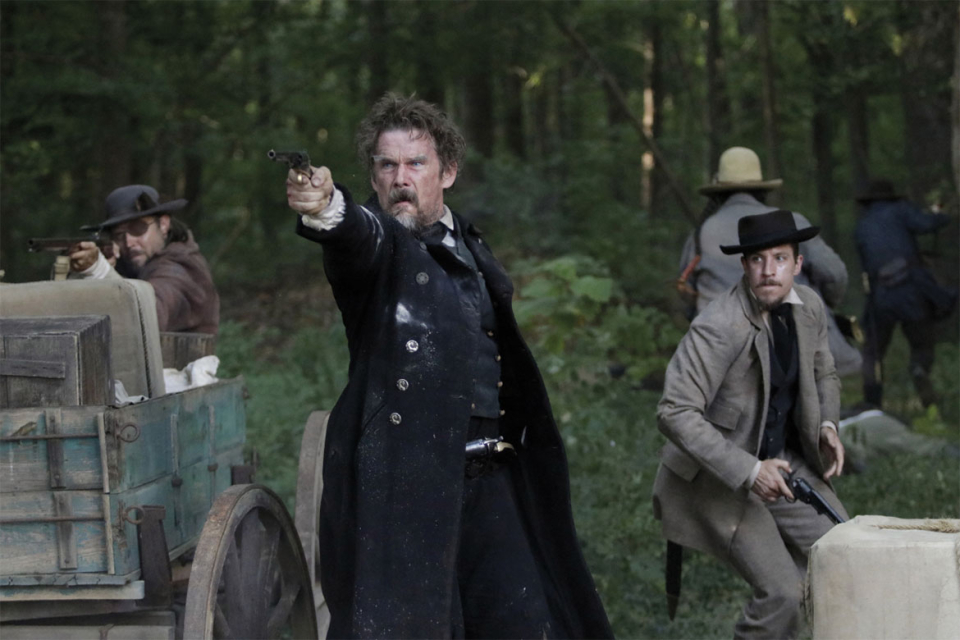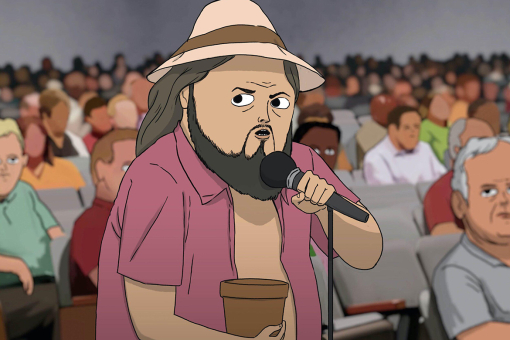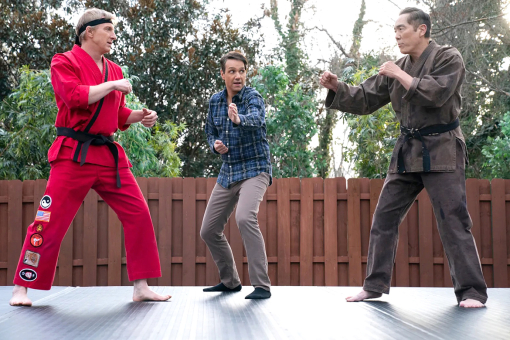You better watch out, you better not cry. You better not pout, I'm telling you why: Santa Claus does not come to Blumhouse Productions.
That's because instead of an office Christmas party, CEO and founder Jason Blum and his staff live it up and party down in late October at a no-expense-spared Halloween bash. "It's our big event," Blum says of the festivities, which have been held everywhere from the headquarters' parking lot to the chic Sunset Tower Hotel in Los Angeles. After a dark year in 2020 because of the pandemic, he says, "We will be back in full swing."
And yes, the boss dresses up. He's been a witch. Ivanka Trump. For his pièce de résistance, he once put on a blonde wig and posed as political siren Stormy Daniels. "It's our favorite time of year," he adds. "And I take it very seriously."
You would, too, if your studio had reinvented the formula for Hollywood success by way of the horror genre. By producing films on modest budgets and marketing to audiences that love to scream in the dark, Blumhouse has amassed $4.8 billion in collective box office receipts over the past two decades, thanks to the likes of Get Out, Freaky, Paranormal Activity, Halloween, Insidious and The Purge saga (the latest installment was released in July).
Now Blumhouse's television division is killing it in a crowded marketplace, minus the blood and guts (mostly). The studio has churned out more than 15 series across various networks and streaming platforms since 2018, including The Purge (USA), Sharp Objects and The Jinx (HBO), The Good Lord Bird (Showtime) and A Wilderness of Error (FX).
EPIX will soon release a slate of Blumhouse-produced horror films, starting with the chiller House on the Bayou. Welcome to the Blumhouse, the second set of four films crafted by underrepresented directors, premieres October 1 on Prime Video. And NBCUniversal has agreed to pay $400 million for Blumhouse and Morgan Creek to make a new trilogy of films based on The Exorcist. These will be the first films to feature Ellen Burstyn reprising her role from the 1973 original; some may air on Peacock.
There's not enough space to list all the projects in the works. Blumhouse Television president Chris McCumber excitedly ticks off collaborations with Dateline NBC — its first project, The Thing About Pam, stars Renée Zellweger — and World Wrestling Entertainment.
In June, Blumhouse announced an exclusive deal with ITV America (Queer Eye, Love Island) to produce unscripted efforts. The first project is Escape the Maze, a survival competition series that McCumber likens to the closing act of The Shining. (Presumably with less death.)
"We're really concentrating on the franchises and type of genre programming we need to grow," McCumber says. "I tell the team there aren't a whole lot of growth stories right now in our industry, but we're being aggressive and we're a very creative partner when it comes to making content. And we continue to build our reputation as a trusted partner. The more work you do, the faster you can go and the more successful you can be."
Scream queen Jamie Lee Curtis is among the stars who have benefited from that success. In the aftermath of the Blumhouse-produced sequel Halloween in 2018, she formed Comet Pictures and approached Blum about a partnership. They've sold four TV series in the past year, including an adaptation of Patricia Cornwell's popular Kay Scarpetta novels.
"I was very inspired by every aspect of Blumhouse," explains the actress, who will revive her Laurie Strode character again in Halloween Kills (out October 15). "I admire the company's attention to filmmakers, the written word, the model and the hustle. But mostly the hustle."
At the center of this energy is a fast-talking, 52-year-old husband, father, son and disrupter. Growing up in New York City, young Jason would spend the week with his mom, an art historian, and weekends with his dad, a famed art gallery owner. Amid all the fancy lunches and museum tours, he'd plop onto the couch to watch his favorite shows on a rabbit-eared TV.
There were lots of 'em. Think Scooby- Doo and The Greatest American Hero and The Love Boat and Knight Rider and Little House on the Prairie and The Brady Bunch and The Dukes of Hazzard. "I still have the General Lee toy car," Blum boasts. One of his dreams is to own the real one.
Blum graduated from Vassar in 1991 and pounded the gritty pavement as a waiter and cable-subscription retailer. He was selling real estate when he met an upstart actor and took a job as the producing director of his Malaparte theater company. "All the young people I knew at the time imagined themselves as rock stars or movie stars or film directors," Ethan Hawke says now. "He was the only young guy I knew who was like, 'I want to be a producer. I want to make shit happen!'"
The two loitered near the TKTS booth in Times Square to hawk flyers for the company's 10-dollar plays. Hawke marveled as his pal yukked it up with tourists, sometimes in French. "It was his idea to do it because he knew people would recognize me from Dead Poets Society," Hawke says, referring to his 1989 breakout film. "We were the first nonprofit theater company to turn a profit, and it wasn't because of good investments. He thinks outside the box."
By age 28, Blum was the copresident of acquisitions at Miramax under Harvey and Bob Weinstein. The company released indie darlings such as Trainspotting, Good Will Hunting and Shakespeare in Love during his five-year tenure. Blum hated it. "I was never crazy about being on the other side of the desk as a buyer," he says. "I wanted to feel the DNA of the project and participate in the upside or downside. I was a gambler and wanted the risk."
Hawke sums it up: "He was miserable at Miramax!" Blum decided to create his own production company in 1999 — and based on the insight of his uncle Gerald, he gave it a familiar and familial title. "He's not in the movie business, but he told me, 'If the movie business is about getting your name out there and building a reputation, why would you start a company without your name in it?'" Blum says. "I took his advice and I'm glad I did."
It took a few years, but Blumhouse ultimately carved out a reputation for making bank on genre movies. (Exhibit A: the 2007 "found footage" film Paranormal Activity in 2007, which was made for $350,000 and earned $193 million.) With a smaller budget, Blum reasoned, directors could take more creative risks with storytelling, casting and editing.
That led to the hits Insidious (2010), Sinister (2012) and The Purge (2013) — the latter two starred Hawke — as well as the dramas Whiplash (2014), Get Out (2017) and BlackKklansman (2018), which were all nominated for the Oscar for Best Picture.
But laurels and the bottom line don't tell the full story. Curtis notes that the Blum X-factor was evident from the moment they met. This was back in 2017, when the two agreed to meet for lunch at L.A.'s Crossroads Kitchen to discuss Halloween.
Blum pulled up in his 2005 white Chevy Astro van-slash-mobile office (he bought it used and customized the interior with carpet, couches and a flat-screen TV so he could work anywhere). "I knocked on the window and right away I understood who he was," she says. "He is the opposite of passive, and that's a really attractive trait."
Hawke is so proud of his longtime friend and nine-time collaborator that he phones from Budapest in the middle of shooting the Knives Out sequel to sing his praises. "You can't just credit the business model," he says. "Jason has an honest, for lack of a better word, joy to him. His greatest thrill is to use his brain and figure out how to crack the system and get something made when it's not supposed to get made — and find a way to make a product better."
On top of all that, the executive is remarkably adaptable. Though he scored Emmys for the HBO drama The Normal Heart in 2014 and the buzzy hit documentary The Jinx: The Life and Deaths of Robert Durst in 2015, his series Stranded, South of Hell, Eye Candy and The River crashed and burned.
Blum — who originally turned his gaze to TV so his favorite artists could flourish in a different medium — realized that if he wanted to cut through the clutter and reach a large at-home audience, he'd have to move beyond monsters and the supernatural.
"The pivot was a challenge," he reveals. "Forget being known as the 'low- budget horror guy.' Just a movie producer breaking into television is hard. I was an adult in the movie company and a kid in the TV company."
The first order of business: "We stretched the brand. If the movie company was about 80 percent horror and 20 percent 'other,' the television company had to be the reverse."
Not to say that "other" translated into sunny teen romcoms. When Blumhouse Television relaunched with a massive rollout in 2018 — complete with five new executives to oversee production, development and business affairs — it attached its name to provocative stories with shadowy villains, such as the HBO thriller Sharp Objects with Amy Adams and Showtime's The Loudest Voice, a limited series about Fox News chief Roger Ailes starring Russell Crowe. Both earned multiple Emmy nominations.
Meanwhile, USA premiered a series based on the popular The Purge franchise. "I remember Jason came to us and said, 'I have this idea about a movie that will lead to a series," says McCumber, who was then president at the USA and SYFY networks. "He was so passionate about his vision. It was a great launch that was driven by Jason's clarity."
Blum and his executives also dropped the company's patented shoestring-budget policy. The reasoning: unlike cash-strapped movie studios, robust streaming services such as Netflix and Amazon were happy to splurge.
"Trying to replicate my movie model in television did not work," he admits. "You could go to a platform and say, 'Look, I can make the show at half the price that was bought from the network,' and they'd say, 'I'd rather a show cost twice as much. I want to spend more on programming and be louder.' The television business is healthy."
That change meant keeping more artistic control over the projects — "The cost structure in our television business is pretty traditional, so there's less freedom for the directors" — but still adhering to Blumhouse quality standards. "We do what we say we're going to do, and do it on budget, and make things that are compelling and interesting," he says.
With that philosophy in place, Hollywood VIPs lined up to shake hands with Blum and his team. Hawke shares that when he attempted to sell his friend on an adaptation of the searing Civil War–era novel The Good Lord Bird — en route to a movie premiere at the South by Southwest Festival in 2016 — he needed some assistance.
"Our driver was an intern at Blumhouse and overheard my pitch and was freaking out that it was the best book he'd ever read," Hawke recalls. "The guy saved my pitch. I didn't have to sound like a friend trying to talk his buddy into giving him a [series]." The limited series aired in 2020 and recently earned a Peabody Award.
Since McCumber joined the company last October, Blumhouse television has expanded at a breakneck pace. "We're accelerating the growth of an already successful business and there are opportunities all around us," he says.
On the unscripted side with ITV America, he's excited about Escape the Maze and keen on creating a version of Ghost Hunters, a show about the paranormal that ran for 11 seasons on SYFY. ("It makes sense with our brand, and it would be a real win for us.")
The NBC limited series The Thing About Pam (starring two-time Oscar winner Renée Zellweger) is set to arrive in the first quarter of 2022. It's based on a stranger-than-fiction 2011 murder previously explored on a Dateline episode (and its podcast). "It's an iconic television brand and it's the first they've ever done something in the scripted space," McCumber explains, adding that the company is eyeing about 15 other infamous cases for subsequent series.
In other IP news, McCumber worked his longstanding USA connections with the WWE to produce The United States of America vs. Vince McMahon, an in-the-works scripted project about an early 1990s trial that almost took down professional wrestling's honcho. "It's a great story," he says. "You'll see the history and all the crazy things that were happening in the league during that time with stars like Hulk Hogan and Jesse Ventura."
Also in the pipeline? A scripted series and reality show based on BBC Radio 4's The Battersea Poltergeist podcast, which documents an infamous haunting from the 1950s; a scripted series focusing on the inspirational Detroit Youth Choir for Disney+ from showrunner Anthony Sparks (Queen Sugar) and an unscripted companion; and an anthology series called Blumhouse's Ghost Story.
All the above stem from a partnership with Michael Seitzman's Maniac Productions. Plus, Curtis and Blumhouse have sold a series to Showtime about a woman who never feels physical pain, as well as a TV show to Amazon Canada about an infamous maple syrup heist. It's enough to make your head spin, Exorcist -style.
But Blum insists he keeps a sane work-life balance, refusing to put in 14-hour days like some of his peers do. Besides, he needs time to watch TV. He loved Dirty John and Hacks and is downright giddy about the 10-part HBO Max docuseries Generation Hustle. As he exclaims, "Each episode is a standalone about a different con artist, and they're all incredible!"
Back in 2014, Blum told emmy he had a specific three-to-five-year plan for his company — and step one was merely establishing a foothold in television. Now he thinks in terms of decades. "I'm always comparing where we are against the plan we made," he says. "My goal is that in 20 years, the company is putting out interesting movies and TV and is profitable," he says.
He'll be 72 by then. And while he "hopefully" won't be working much, he vows, "There still will be a successful movie and TV company called Blumhouse."
There certainly will be in the immediate future: "We want to make sure the Blumhouse name is synonymous with compelling television," McCumber says. "We are going to double down on the brand... which means making premium content in the supernatural, science-fiction, horror and kickass action genres. And we're going to support the craziest, most out-there ideas because that's how great, fresh and culture-defining content gets made."
Blum likens the brand to another pop-culture behemoth: "I want people to look at us like they look at Marvel, in that it's strong and the audience absolutely loves it." Certainly, the second-annual BlumFest, a virtual fan-geared "convention" on October 1 featuring panels and exclusive screenings, is an essential step in the direction of Comic-Con's famed Hall H.
And someday soon, one of those exhilarated viewers may even join the Blumhouse party. Inside its headquarters, Curtis says, walls are lined with photos of all the directors who have worked with the company.
"And then at the very end there's a mirror, and you look in it as if to say, 'It can be you, too,'" she says. "Jason wants to help people manifest their destiny through hard work, creativity, passion, talent and tenacity. That's the message he gives you, and that's why his company is a success."
This article originally appeared in emmy magazine, Issue No. 10, 2021
We chat with Ethan Hawke about his long friendship with Jason Blum HERE; We speak with Jamie Lee Curtis about her upcoming projects with Jason Blum HERE














